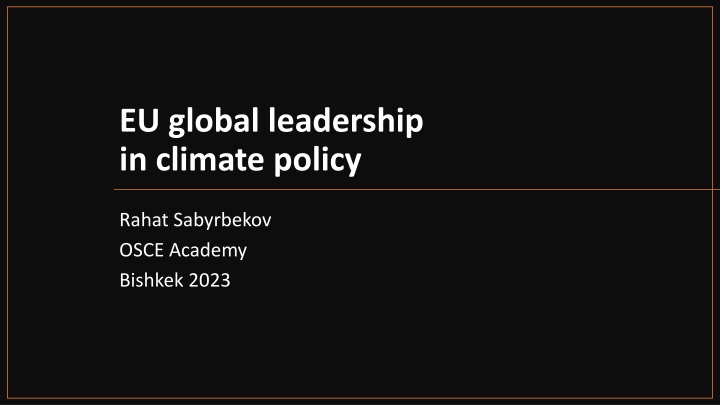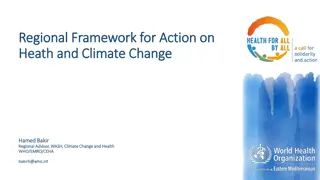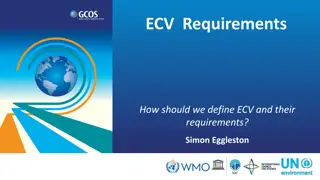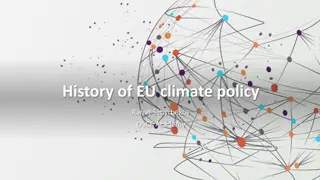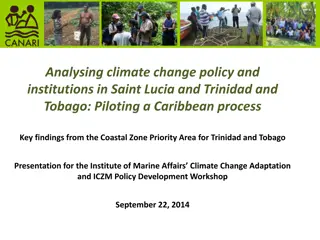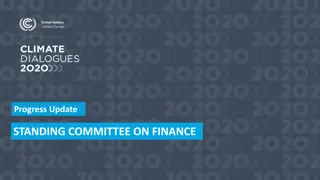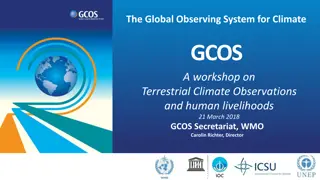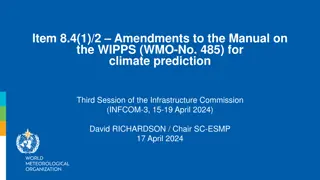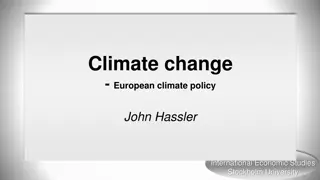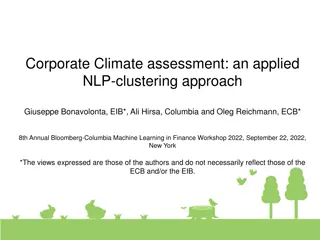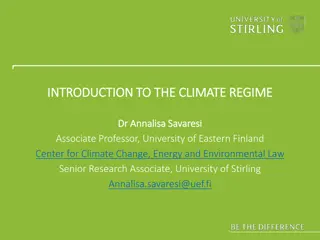EU Global Leadership in Climate Policy - Assessment and Analysis
The European Union (EU) has been at the forefront of international climate change leadership for decades, navigating challenges and actively engaging in various climate agreements. This comprehensive assessment delves into the framework, analysis, and appraisal of EU climate leadership, highlighting the evolving strategies and contributions towards global climate governance.
Download Presentation

Please find below an Image/Link to download the presentation.
The content on the website is provided AS IS for your information and personal use only. It may not be sold, licensed, or shared on other websites without obtaining consent from the author.If you encounter any issues during the download, it is possible that the publisher has removed the file from their server.
You are allowed to download the files provided on this website for personal or commercial use, subject to the condition that they are used lawfully. All files are the property of their respective owners.
The content on the website is provided AS IS for your information and personal use only. It may not be sold, licensed, or shared on other websites without obtaining consent from the author.
E N D
Presentation Transcript
EU global leadership in climate policy Rahat Sabyrbekov OSCE Academy Bishkek 2023
The European Unions international climate leadership: towards a grand climate strategy?, Journal of European Public Sebastian Oberth r & Claire Dupont (2021)
Introduction The EU has pursued international climate change leadership since the early 1990s Despite challenges, the EU has exerted leadership in various climate agreements An up-to-date, comprehensive assessment of EU climate leadership is needed
Assessment Framework The framework distinguishes between exemplary and diplomatic leadership Both domestic and external dimensions of EU leadership are considered Evolving framework conditions are taken into account
EU Climate Leadership Analysis The EU has adapted its climate diplomacy to evolving challenges Domestic policies and politics have contributed to EU leadership The European Green Deal launched in 2019 represents a post-Paris development
The EUs International Climate Leadership: Assessment Framework To qualify as a leader in global climate governance, an actor must pursue ambitious policy objectives towards multilaterally agreed climate goals. Leadership can be distinguished from its effectiveness, which is an empirical question. The appraisal of the EU s international climate leadership focuses on whether and to what extent the EU has mobilized its climate leadership capabilities.
EU Leadership and Its Appraisal Neither international policy outputs nor outcomes/impacts are useful/appropriate yardsticks to appraise EU leadership. Goal achievement is similarly unsuitable because other variables intervene between the EU s actions and the outcome of negotiations. To appraise the EU s international climate leadership, the focus is on investigating the adequacy of the EU s own input into and contribution to international climate policy.
Framework Conditions Investigating framework conditions can constitute challenges to the EU s international approach and may require adapting this approach for maximum international impact. The EU s legal-institutional set-up significantly shapes and conditions EU leadership. Investigating EU domestic climate politics drives exemplary leadership but does not directly affect the EU s international approach.
Exemplary and Diplomatic Leadership Leadership types can be grouped into two broad categories: exemplary and diplomatic leadership Exemplary leadership is based on domestic policy action and includes target-setting and legislative frameworks, resulting GHG emissions, and international credibility Diplomatic leadership combines structural, cognitive, and entrepreneurial leadership and aims to coerce, convince, and cajole other parties into action Exemplary and diplomatic leadership are interrelated and interact, and their integrated use can maximize influence
Exemplary Leadership Exemplary leadership provides three means of international influence: underpins international credibility, inspires other actors through policy learning and diffusion, and materially incentivizes other actors to adapt Domestic policy is a significant means of international influence and includes market and regulatory power Exemplary leadership is derived from domestic policy action and incorporates aspects of ideal-typical structural leadership
Diplomatic Leadership Diplomatic leadership is premised on coherence and unity among EU member states and how well the EU coordinates for coherence and unity Diplomatic leadership involves mobilizing structural, cognitive, and entrepreneurial capabilities, including diplomatic contacts, outreach, and finance, to fit the prevailing international context To assess diplomatic leadership, we should investigate the extent to which the EU has effectively coordinated for coherence/unity and deployed its capabilities to fit the international context The integrated use of exemplary and diplomatic leadership can maximize the EU's influence in international climate leadership.
The EUs international policy goals, goal achievement, and resulting outcomes EU has pursued the most ambitious science-based international climate policy objectives of the major economies EU has consistently advocated for binding mitigation obligations for developed countries EU achieved its international leadership objectives from the 1990s, crashed in Copenhagen in 2009, and recovered modestly in the 2010s
Framework conditions are met? International context captures core elements of the climate-related geopolitical shifts Domestic legal-institutional framework concerns the EU s governance constraints National climate legislation has spread especially among larger emitters, but it has so far only resulted in tempering global emission growth rather than steep emission reduction
International climate politics and its institutional framework International climate governance has become polycentric Paris Agreement reflects the EU s main, moderated policy objectives Effective mechanisms for coordination of EU external climate policy are needed to align both EU institutions and its member states.
EU Climate Policy Framework The EU has developed a robust climate policy framework. Decadal frameworks for climate and energy policy have been implemented. The framework includes several key implementing legislations, addressing various sources of emissions, such as cars and fluorinated GHGs.
Achievements of EU Climate Policy The EU has met or exceeded its domestic mitigation targets so far. The EU is on track to exceed its 20% emission reduction target for 2020. The EU is not on track to meet its emission targets for 2030 and 2050, requiring considerable additional efforts.
European Green Deal The European Green Deal, launched in 2019, promises additional efforts to meet 2030 and 2050 emission reduction targets. The Green Deal foresees a suite of proposals for implementing legislation, prioritizing climate policy objectives across all EU policy fields. The Green Deal includes a Just Transition Mechanism and Fund to support sectors dependent on fossil fuels or carbon-intensive processes.
EU's Global Influence EU climate policies have become a benchmark and a source of inspiration for others. The expansion of the EU s climate policy portfolio has enhanced the potential for policy diffusion. Climate policy has become essential in shaping access to the European market and building the regulatory and technological capacity to address climate change.
Discussion and Conclusions Approach used to systematically assess the EU's leadership record on climate change. The EU has achieved important results in mobilizing its capacities and adapting to external conditions over the past decades. The EU has significantly adapted its international approach to the evolving turbulent context, including the rise of emerging powers and growing polycentricity.
Key Challenges for EU Climate Leadership Maintaining and expanding achievements in coordination of climate diplomacy across foreign and climate policy. Advancing effective 'polycentric' engagement beyond the UN process. Developing a more strategic approach that emerged in the 2010s into a full-fledged joint grand climate strategy
Facilitating EU Grand Climate Strategy The EU lacks a strategic center capable of coordinating a grand strategy at the highest political level. A new body of high-level climate ambassadors or 'czars' could advance discussions on grand climate strategy and facilitate maintenance and further development of existing achievements. Even if full strategic convergence may remain illusory, creating related structures and capacities could facilitate joint strategizing.
EU and Paris agreement https://www.youtube.com/watch?v=s- jJIupxF_A EU example: https://www.youtube.com/watch?v=pU bHGI-kHsU
Thank you! Questions? r.sabyrbekov@osce-academy.net
